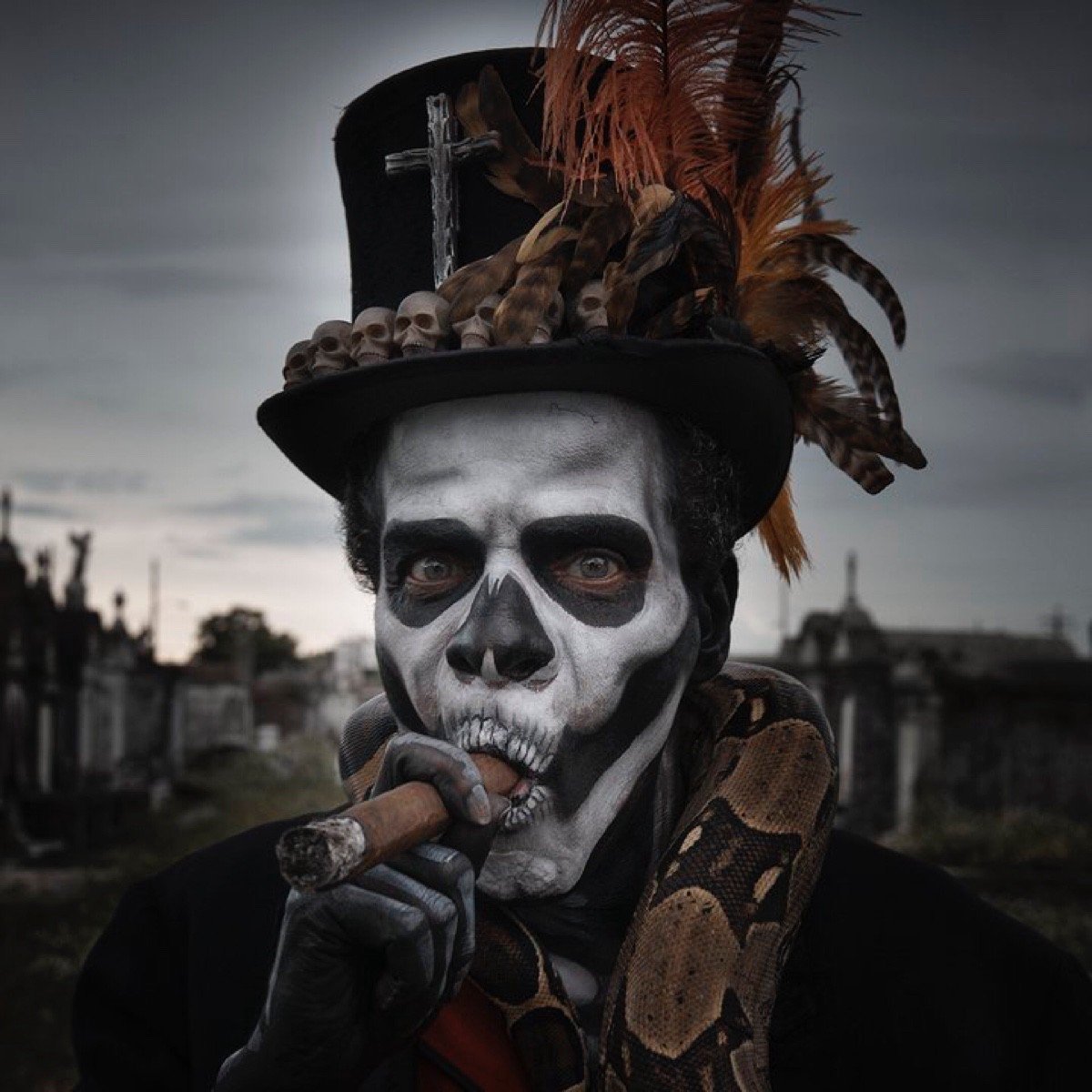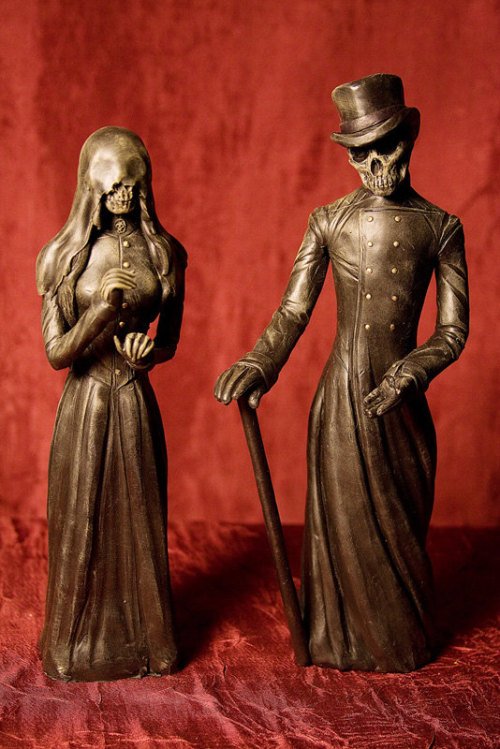This is the second article in my Haitian Vodou series. If you are not familiar with the basics of Haitian Vodou, I recommend reading my introduction article to the series first.
I have already explained how Loa (spirits) in Vodou are split in different nanchons (families) in my previous post. Baron Samedi, The Master of the dead, leads the Ghede nanchon together with his beautiful wife Maman Brigitte. He drinks rum and smokes cigars, he is rude, crude, charming and he often chases mortal women, despite being married to Maman Brigitte. She is The Lady of the cemetery, protectress of the gravestones and mistress of healing. She is sexual, rude and charming as her husband. They are both among the most powerful and respected Loa in Vodou.

Depiction of Baron Samedi, photography by Matt Barnes
Ghede
Ghede (Guédé, Gede) is the most numerous nanchon of the Loa in the Haitian Vodou, and their numbers are only known to Baron Samedi and Maman Brigitte. They embody the powers of death and fertility. In Europe, we are often afraid of death and see it as something grim and dull (grim reaper as the representative of death in Western pop culture).
Ghede, rulers over death and life are on contrary the jolliest and most sexual group of spirits in Haitian Vodou. Their festival is held on 2 November and even those who don't practice Vodou are glad to be part of Ghede fete due to the amount of obscenity and fun that happens there.
All members of the Ghede family are rude and crude (although rarely to the point of insult) as their master, but most lack his charm. Ghede is the most lively family of Loa. This family is loud, sexual and usually a really fun bunch. Each of them drinks smokes, and curses a lot; they are the spirits who have already died so they have nothing to be afraid of. When they visit the service, they will frequently display how far beyond consequences and feelings they are by eating raw chili and rubbing their sensitive parts with chili rum. Once they possess a ceremony participant they are known to talk descriptively about sexually associated parts of the human body, get drunk to the boot and reveal embarrassing secrets of the possessed to those present.
All spirits have their veve, dances, and rhythms. Loa from Ghede family is particularly fond of Banda, music with quick rhythmic drumming and sexually suggestive dances.
A song played for Baron Samedi on Ghede fete.
Baron Samedi
Baron Samedi is the most notorious and lively Loa of the nanchon notorious for their notoriety. He is well known for obscenity, debauchery and having a particular fondness of rum, tobacco and mortal women. Although Baron often enjoys a good dance alongside all previously mentioned vices, none of those get in a way of Baron’s duties of digging graves and healing those close to dying.
Baron Oh! Baron Oh!
Baron Oh! Baron Oh!
Rude children, who are disrespecting the elders
bring them to the Cemetery.
Such outrageous behavior serves two purposes. One is to show everyone that he no longer heeds the rules of the living, reminding everyone that death is constant and how it will come for every person. Another purpose is to remind the living to enjoy the benefits of the mortal real while they still occupy it, as death will come for all of them.
He is depicted as a tall, handsome black man with a skeletal appearance. He is wearing a tuxedo, a stylish walking cane, a top hat, and sunglasses (sometimes sunglasses are missing one lens, this is because Baron is capable to see the worlds of the living and the dead at the same time). He usually has cigars and rum somewhere about his person and cotton plugs in each nostril.
Baron Samedi spends the most time in his spirit form in Vilokan making filthy jokes to the other spirits. His duty is leading souls of the dead to Vilokan. Each person will meet him at least once, as he waits for them at the crossroads between the world of the living and the dead.
He is the only one who can accept an individual into the realm of the dead. Once Baron Samedi digs a grave for a person, the person dies. As the soul of the deceased rises from the grave, Baron greets it and leads them to the underworld.

Veve for Baron Samedi, drawn and vectorized by Chrkl
No one can die if Baron Samedi refuses to dig their grave so, in his particular way, he is also a giver of life. He is associated with extraordinary healing powers. By refusing to dig a grave for someone Baron can prevent death and heal them from any ailment or wound, provided he believes it is worthwhile to save that person. Besides allowing the physical wound to heal, he also has the power to lift the most powerful curses and hexes that afflict someone.
His duty of the graveyard guardian also includes ensuring a person is buried properly. After the burial, he watches over their graves to ensure they rot in the ground as they should. He does this in order to prevent their soul from coming back as mindless zombies.
What Baron Samedi demands his services greatly depends on his mood. Sometimes he is content with his followers wearing purple, black or white. At other occasions, he requires simple gifts which include rum, cigars, black coffee or grilled peanuts. When he is particularly moody he requires a Vodou ceremony with music, dancing, and sacrifice of an ox for the fest in order to be bothered to cross over into this realm.

Maman Brigitte
Maman Brigitte, The Lady of the Cemetery is the beautiful wife of Baron Samedi. Together they lead the Ghede family. She drinks piman, raw rum infused with 21 hot peppers. It is said to be so hot no mortal can taste it. Like Baron, she is also known for obscenities, wild dances, and raw sexuality. Maman Brigitte always speaks from the heart and has no patience for fools, so she often swears and uses filthy language.
Maman Brigitte is one of the only white Loa in Vodou. She is one of the Loa who wasn’t brought to Haiti from Africa. Her origins are in Ireland and she is strongly tied to the Celtic goddess Brigid (goddess of poetry, smithcraft, and healing). She was incorporated to Vodou after Irish women sentenced for crimes were sent to work on sugar plantations alongside African women.

Veve for Maman Brigitte, drawn and vectorized by Chrkl
Maman Brigitte is pictured as a beauty with red-gold hair and emerald green eyes. Her colors are black and purple, and she is represented by a black rooster. Her duty is protecting and blessing the gravestones in cemeteries, provided they are properly marked with a cross. She calls upon us to face our mortality and encourages us to respect death and our ancestral lines. Maman will exact punishment upon all those who fail to respect and tend to the deceased.
Maman Brigitte is a healer and she is worshiped especially when someone is heavily ill and in a need for a fresh start. Her powers are not limited to healing physical illness, as she rules over spiritual death as well. She can heal ones ti bon ange if she finds it worth her effort.
In addition to having the power to heal, Maman is the one to decide if a person should be healed. If not, she would put the person in the care of Baron Samedi. She then personally escorts them into the Vilokan, together with her husband.
Besides her healing and graveyard duties, she is associated with fertility and justice. Her followers believe that she is the ultimate judge who can be called upon to inflict retribution on those who harm them. She is also the Loa of money and expects people to fully respect transactions of money. Although such transactions should be fully respected, money and personal belongings are never to be taken too seriously. To remind us of that she sometimes steals top hat and cane from Baron Samedi for sheer enjoyment.
If you liked this post, follow me for more articles about mythology or read my other posts from the mythology category:
Haitian Vodou - History, Beliefs and Practices
Ravens - Powerful Symbol in Mythology & One of The Most Intelligent Species
